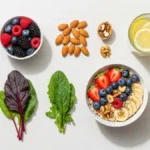During the 1970s and 1980s, health awareness was rising rapidly in the United States. People were leaning toward low-calorie and sugar-free beverages. Seeing this demand, The Coca-Cola Company introduced Diet Coke to target health-conscious consumers who wanted to avoid sugar and excess calories but it’s really Zero Calories ??
- Launched in 1982.
- First introduced in New York City.
- Made with a completely different formula from classic Coca-Cola.
- The taste was different from original Coke, but the name kept a strong brand connection.
- Quickly became one of the most popular diet drinks in the USA.
“Zero Calories ≠ Zero Risk”
People often choose Diet Coke thinking it’s a healthier option because it contains no sugar and zero calories. But the truth is quite different. The artificial ingredients in it can have a slow but harmful impact on the body over time. Aspartame, an artificial sweetener, can confuse your metabolism, while phosphoric acid may weaken your bones. Caffeine, though energizing, can disrupt your mood and sleep patterns.
Perhaps the biggest concern is that Diet Coke offers no nutritional value — no vitamins, no minerals, no fiber. In simple words, it satisfies your taste buds and cravings but provides nothing beneficial to your body. Just because it’s calorie-free doesn’t mean it’s risk-free.
What’s Inside One Can (355 ml) of Diet Coke?
It may look like just another fizzy, harmless drink — but what’s really hiding behind that silver can?
Let’s break down each ingredient to see what you’re actually sipping with every gulp.
Because when it comes to your health, what you don’t know can hurt you.
1. Carbonated Water
This is the base of Diet Coke. Carbon dioxide gas is added to water to give it a fizzy and bubbly texture.
While it makes the drink refreshing, frequent intake may lead to bloating, acidity, or gas in some people.
2. Aspartame (Artificial Sweetener)
Aspartame is about 200 times sweeter than sugar but has zero calories.
It is used to provide a sweet taste without raising blood sugar.
However, it may cause headaches, mood swings, or digestion issues, especially in sensitive individuals.
It is dangerous for people with a genetic disorder called PKU (Phenylketonuria).
3. Phosphoric Acid
This acid gives Diet Coke its sharp tangy taste and helps preserve it.
However, it can reduce calcium absorption, leading to weaker bones over time.
Long-term use has been linked to bone density loss and even osteoporosis.
4. Caffeine (Approx. 46 mg)
A natural stimulant that makes you feel alert and awake.
While a small amount may feel energizing, too much caffeine can cause anxiety, increased heart rate, and insomnia, especially in caffeine-sensitive individuals.
5. Sodium (Approx. 40 mg)
A small amount of sodium helps balance flavor and preserve the drink.
While the quantity is low, regular consumption may add up and contribute to high blood pressure or water retention in some people.
6. Natural Flavors
These are used to give Diet Coke its signature taste.
However, companies do not disclose what these “natural flavors” are, making it risky for people with food allergies or sensitivities.
7. Potassium Benzoate
A preservative that keeps the drink fresh and bacteria-free.
In rare cases, when combined with Vitamin C, it can form benzene, a compound with potential cancer risks.
8. Acesulfame Potassium (Ace-K) (in some variants)
Another artificial sweetener that adds extra sweetness without calories.
Some people report a bitter aftertaste, and research is still ongoing about its long-term effects.
9. Zero Nutritional Value
There are no calories, no sugar, no protein, no fat, no carbs, and no vitamins.
Simply put: Zero Calories = Zero Nutrition
You get the flavor but zero health benefits.
“Sip Smart: Learn from This”
Diet Coke may look like a smarter choice, but for some, it turned into a health wake-up call.
These real-life inspired stories reveal how something labeled “zero” can still leave a lasting impact. Before you crack open that next can, hear what happened to those who thought it was harmless.
Case 1: Bone Health – Phosphoric Acid and Bone Loss
Study Reference: Cola consumption and bone mineral density in older women
Published by: Tufts University, American Journal of Clinical Nutrition
Older women who regularly consumed cola beverages (including Diet Coke) had significantly lower bone mineral density in the hip compared to non-cola drinkers. Researchers linked this effect to phosphoric acid and caffeine, which may interfere with the body’s ability to absorb calcium.
Case 2: Weight Gain – Artificial Sweeteners & Metabolic Confusion
Study Reference : Gain weight by ‘going diet?’ Artificial sweeteners and the neurobiology of sugar cravings
Published by : Yale Journal of Biology and Medicine
Artificial sweeteners like aspartame may trick the brain’s reward system into expecting real sugar. When it doesn’t receive actual calories, the brain may trigger stronger cravings, potentially leading to overeating and weight gain, especially in those trying to follow a calorie-restricted diet.
Healthier Alternatives to Diet Coke
If you’re trying to cut back on Diet Coke but still crave something fizzy, flavorful, and refreshing — don’t worry! There are plenty of healthy and satisfying drinks available in the U.S. that won’t compromise your well-being.
1. Sparkling Water with Natural Flavors
Brands to Try: LaCroix, Spindrift, AHA
Zero calories, zero sweeteners, and no artificial chemicals.
Refreshing fizz with real fruit essence.
Great for replacing the “feel” of soda without the health risks.
2. Unsweetened Iced Herbal Tea
Popular Flavors: Hibiscus, Peppermint, Ginger, Lemon Balm
Naturally caffeine-free and full of antioxidants.
Helps with digestion, reduces stress, and hydrates better than soda.
Add lemon or mint for extra taste.
3. Infused Water (DIY at Home)
How to Make: Add cucumber, lemon, mint, berries, or oranges to cold water
Zero calories, full of vitamins and freshness.
Supports detox, boosts hydration, and is wallet-friendly.
4. Kombucha (Low-Sugar Fermented Tea)
Brands to Try: Health-Ade, GT’s, Kevita
Contains probiotics for gut health.
Lightly fizzy and available in many fruity flavors.
Check labels for sugar — pick low-sugar options.
5. Cold Brew or Iced Black Coffee (Unsweetened)
Natural caffeine without added sweeteners or chemicals.
Rich taste and energy boost with zero calories.
Add a splash of oat or almond milk if needed.
6. Coconut Water (100% Natural)
Hydrates with natural electrolytes like potassium and magnesium.
Slightly sweet, low in calories, and great post-workout.
Avoid versions with added sugars.
Pro Tip for Habit Breakers:
Don’t try to quit Diet Coke overnight — that can backfire. Instead, swap one can a day for a healthier drink. Gradually, your cravings will fade, and your energy levels may even improve.
Missing the fizz? Go for sparkling water with citrus or herbal iced tea with mint. These drinks mimic the feel of soda without the artificial chemicals, helping your brain adjust more easily.
Turn your new habit into a routine: try DIY infused water with cucumber, lemon, or berries. It’s not just healthier — it feels like self-care in a glass.
Keep a simple journal or phone note. Notice how your body feels after choosing a healthier drink instead of Diet Coke — better sleep? Less bloating? Use that as motivation.
Think Before You Sip
Diet Coke may promise “zero calories,” but the science and stories show us that it doesn’t always mean zero impact. From weakened bones to unexpected weight gain, the risks of artificial ingredients can add up over time — especially when the habit becomes daily.
Instead of blindly trusting labels, it’s time we start listening to our bodies. Health isn’t just about cutting sugar — it’s about choosing what truly nourishes us.
So next time you reach for a can, ask yourself:
“Is this really refreshing my body, or just fooling my taste buds?”
Make the smart switch — not just for fewer calories, but for more life.







